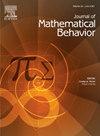一年级学生对变量的理解:函数机环境下的学习轨迹
IF 1.7
Q3 EDUCATION & EDUCATIONAL RESEARCH
引用次数: 0
摘要
本研究考察了函数机器学习环境如何实例化一年级学生理解变量的发展轨迹。干预包括探索投入产出关系和不确定数量的符号表示。在三个时间点,即干预前、干预后和干预后六周,通过课堂互动和访谈收集数据。分析揭示了多种发育途径。有些学生直接从预变量推理发展到变量符号的高级代数应用。另一些人则在中间阶段巩固了他们的理解,或者表现出误解,比如把字母当作标签。虽然有少数学生退步了,但大多数人保持或加深了他们的新认识,这表明学习的持久性。这些结果突出了功能机器作为教学工具的潜力,可以促进探索,识别误解,并提供及时的指导。他们还展示了学习轨迹如何为教学设计提供信息,从而促进早期功能推理,并挑战对年轻学习者代数能力的缺陷看法。本文章由计算机程序翻译,如有差异,请以英文原文为准。
First graders’ understanding of variables: Learning trajectories in a function machine environment
This study examines how a function machine learning environment can instantiate a developmental trajectory of understanding variables in first-grade students. The intervention involved exploring input-output relationships and symbolic representations of indeterminate quantities. Data were collected through classroom interactions and interviews at three time points: before, immediately after, and six weeks following the intervention. The analyses revealed multiple developmental pathways. Some students progressed directly from pre-variable reasoning to advanced algebraic applications of variable notation. Others consolidated their understanding at intermediate stages or displayed misconceptions, such as treating letters as labels. Though a few students reverted, most maintained or deepened their new understandings, demonstrating the durability of learning. These results highlight the potential of function machines as instructional tools that facilitate exploration, identify misconceptions, and enable timely guidance. They also show how learning trajectories can inform instructional designs that foster early functional reasoning and challenge deficit views of young learners' algebraic capacities.
求助全文
通过发布文献求助,成功后即可免费获取论文全文。
去求助
来源期刊

Journal of Mathematical Behavior
EDUCATION & EDUCATIONAL RESEARCH-
CiteScore
2.70
自引率
17.60%
发文量
69
期刊介绍:
The Journal of Mathematical Behavior solicits original research on the learning and teaching of mathematics. We are interested especially in basic research, research that aims to clarify, in detail and depth, how mathematical ideas develop in learners. Over three decades, our experience confirms a founding premise of this journal: that mathematical thinking, hence mathematics learning as a social enterprise, is special. It is special because mathematics is special, both logically and psychologically. Logically, through the way that mathematical ideas and methods have been built, refined and organized for centuries across a range of cultures; and psychologically, through the variety of ways people today, in many walks of life, make sense of mathematics, develop it, make it their own.
 求助内容:
求助内容: 应助结果提醒方式:
应助结果提醒方式:


